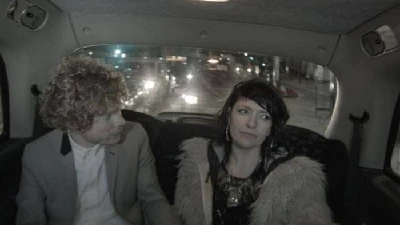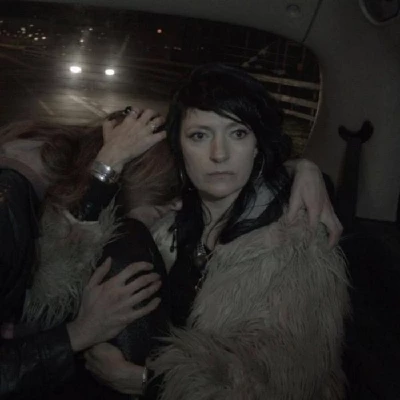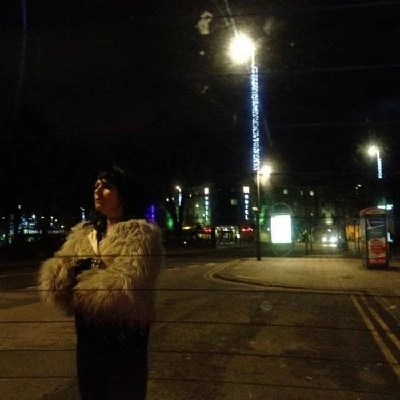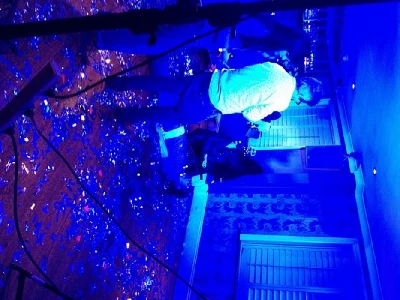Madam
-
Interview
published: 5 /
2 /
2016
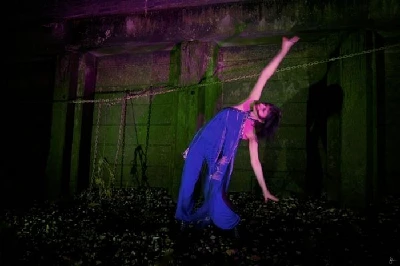
John Clarkson speaks to London-based singer-songwriter and Madam front woman Sukie Smith about their forthcoming third album, 'Back to the Sea'
Article
“There is an element of the profound and the ridiculous in most situations”, says Sukie Smith, “and it is true also about the subject matter of most of my song writing. You can have something that in one sense is tender and beautiful, yet at the same time you can’t be a grown up without realising that things are often complex.”
It is her first interview about it, and Smith is talking to Pennyblackmusic about her band Madam’s third album, ‘Back to the Sea’, which is due for release on her own label, Shilling Boy Records, in the summer.
Smith’s recording career did not take off until relatively late on with the musically ethereal, lyrically forceful ‘In Case of Emergency’, which came out on Reveal Records in early 2008. She followed it in mid-2011 with Madam’s second album, ‘Gone Before Morning’, which, with Reveal having closed down, was funded through the aid of a PledgeMusic campaign and also released on Shilling Boy Records.
While Sukie Smith spent years singing or playing bass in various bedroom acts that went nowhere before forming Madam in 2003 initially as a solo project, then with a rotating cast of musicians and finally as a five-piece band, one suspects that perhaps another reason why it took her musical career so long to flower is her lyrical focus.
On all three of her albums Smith tells with a dreamy melancholy of relationships that, while often brief, are caustic in their intensity; of romantic and other betrayals, and of lovers and other loved ones who have either disappeared or, bleaker still, passed on. All of this is done with the sort of unflinching honesty and self-knowledge that only comes with experience and years of having faced up to life in all its blows head on.
At one level ‘Back to the Sea’ picks up from where both ‘In Case of Emergency’ and ‘Gone Before Morning’ ended. The music, in which long-term member Sarah Gill’s brooding cello is often a dominant instrument, is turbulent and atmospheric, swinging from the fragile to the cinematic, and the melodic to the discordant. On ‘Rules of Love’, which will be released as the album’s first single in late February, Smith finds an unusual camaraderie with someone despite his outlandish behaviour. ‘When I Met You’ has Smith reflecting on somebody, once of huge emotional precedence, who Is now no longer in her life. ‘Three Sixes’ tells of a relationship that involves three parties and on the harrowing, heart wrenching ‘No Ghost’ she tries to call up the spirit of her late father.
Yet at another level ‘Back to the Sea’ is very much a departure, and takes both Smith and Madam in several new directions. The self-loathing that embedded tracks such as ‘Can’t Help Myself’ and ‘Dirty That Makes Me’ on ‘In Case of Emergency’ and ‘Tar and Serpents’ on ‘Gone Before Morning’ is gone, replaced by a wry self-acceptance. The songs are also sometimes less autobiographical, especially the chilling ‘Night Watch’ which depicts an American town at night, where in the canyons just outside its boundaries wolves symbolically prey. There is also, for all its melancholy, a greater sense of hope than before on ‘Back to the Sea’. The strident opening title track finds the London-based Smith who was brought up on the Essex coastline in Southend-on-Sea returning to the sea of her youth, and coming away with a renewed sense of both freedom and self-determination. On the final track ‘The Connection’ she finds out that an early love, who she has not seen in any years, has died young. Yet here also, as Sukie Smith tells Pennyblackmusic, there is new hope.
PB: When you first told us that you had begun work on this new record, ‘Back to the Sea’, three years ago, you said that you had surprised yourself as you were writing some happy songs for it. Many of the songs on ‘Back to the Sea’, such as ‘Three Sixes’, ‘When I Met You’ and ‘No Ghosts’, are - at least on the surface - pretty bleak. Do you think that still holds true?
SS: Yes, I do because the two songs that top and tail the album, ‘Back to the Sea’ and ‘The Connection’, are the two most positive songs that I have ever written. ‘Back to the Sea’ is a call to arms in a lot of ways, a rallying call. ‘The Connection’ is at one level a sad story, but it is also about the realisation of the impact of somebody who has died on your life and from that the interaction of everyone who has ever been a part of your life, and how you must be grateful and acknowledge that you have got to wherever you are that is because of all this stuff that has happened to you first. I see it as a positive thing.
Recently I was listening back to Madam’s two other albums and thinking that they both sounded so sad, but this album doesn’t have to it that same sense of hopelessness to it. ‘Three Sixes’, for example, is dark. It is about betrayal, but is also about one level not minding it and being alright with it (Laughs). It is about a situation that is negative but the result isn’t.
PB: ‘Ride the Waves’, which was the last track on ‘Gone Before Morning’, like the title track on the new album, uses the sea as symbolism and was also about triumph over sadness. It comes from a similar place, especially with the lines “Come on/Rise up be strong/This freedom is so hard won/We can make our bones/Make them count.” Was it a conscious decision to start off from where you left off last time?
SS: Yes, it was, definitely. The whole idea of the sea is there a lot of the time with me. I wrote a song the other day, and there I was singing about something and I snuck in a bit about the sea, and I was like, “Again!”(Laughs). I can’t help it. I was brought up by the sea, and I guess it comes from that. It is probably in most people’s mind most of the time in this country though as we live on an island (Laughs).
There are some answering songs that go on in this third album in response to songs from the first and second album. For example, there is a kind of desperation in in ‘Left to Break’, a real despair, but there is an understanding of what I could do to exit the situation in that song and it references ‘Rope Trick’ on ‘In Case of Emergency’, which is about a similar high wire act that has gone dreadfully wrong.
PB: ‘Rules of Love’, the second song, seems to be about a relationship that is verging on the sado-masochistic and liking someone to quote you who has “no order of natural things”.
SS: With ‘Rules of Love’ I set myself a task of writing a whole relationship in one song in three minutes – the beginning, the middle bit and the disastrous end and the part where you become alright with it all. It is not particularly judgemental. It is more about understanding that people are not always what you want them to be and recognising that as part of your journey too. I wasn’t what that person wanted, and he wasn’t what I was looking for either. There is a perhaps an element of sado-masochism to ‘Rules of Love’, but I see it as more gentle than that.
PB: ‘When I Met You’ has the lyric: “Every part of London reminds me of someone that is not now/That is not now.” It is extremely evocative. How much of that can be applied to people who have died and people who you just don’t see now?
SS: It is to do with ghosts, but it is also to do with the living too. I have lived in London most of my life now. I haven’t particularly lived anywhere else, and a lot of my memories are associated with it. You go through different bits of London, and you go, “Oh yeah, I remember.” Your past may stay hidden from yourself for a long time, but it can come back to haunt you, can’t it? The whole of West London, for example, is tied up for me with a dear friend who isn’t there anymore.
I see that song as being about the relationship that you have had with people, whether they are alive or not. They will always exist in parts of London. Perhaps they are carrying on. I don’t always know. They are just not there anymore, but your memory of them is connected to that place.
London is changing so much at the moment. So much of it is being knocked down. There are buildings and whole streets which aren’t there, which I have got really strong memories of, and that song is about that too.
PB: You have said in the past that all your songs were about yourself. Your Christmas single of a couple of years ago ‘O Tiny Child’ was adapted from a sixteenth century lament about the Massacre of the Innocents and could have equally applied to the Syrian situation. There are songs on this which also seem not quite so directly about you. ‘Not Here Yet’, for example, finds you contemplating the prospect of childbirth, but you’re not a mother, are you?
SS: No. That song just arrived. It is weird. That sometimes just happens. You just write a song and you don’t know who you have written it for and if it is for you. The song just channels out of your mouth, and that is what happened here.
I played it to somebody that I was playing bass with at the time, and I said, “I have written this song and I don’t know if it is any good.” He was like, “It is probably one of the best songs that you have ever written,“ and I was like, “And I was going to throw that one away, but I thought that I would show it to you first (Laughs).” That is a huge song for lots of reasons. That song was a visitation,
PB: ‘Night Watch’ is about the darkness just beyond the surface. Again it doesn’t seem quite so directly personal.
SS: It is a very visual song. I started out thinking about surveillance and wrote one version which was very paranoid about drones and all your information being collected one way or another. A draft of that version ended up on a track that I recorded with Silent Strike, who is a Romanian electronic musician, but this version is very different. It is just about the idea of being observed constantly and what that might do to you. I was playing the old Bobby Vee song, ‘The Night Has a Thousand Eyes’, a lot at the time, which is very creepy, and that was a direct inspiration.
PB: ‘No Ghost’ is absolutely heartbreaking. On it you try to conjure up the spirit of your late father through magic. Was that the most difficult song on the album to write?
SS: It did take a long time to write. I don’t know if it was because of the subject matter, but it took me about a year to finish. I used to be quite nervous of anything like that. I was really doing those things though. I would take myself into the spookiest places that I could, having been fucking frightened of all that stuff for years. I really wanted some proof that there was an afterlife. That would have been comforting. I would go and sit in churches sometimes as well waiting for something to happen, and I spoke to mediums,
PB: And you didn’t find anything?
SS; No, I didn’t. It made me less fearful of things like magic and spiritualism though, which is maybe a good thing.
PB: ‘Back to the Sea’ is musically very complex. With both ‘In Case of Emergency’ and ‘Gone before Morning’ you planned out everything in advance before you went into the studio. Is that still the way it works?
SS: No, a lot of it this time was down to editing. We had two guitarists on this record. John Robertson, who had been in Madam for years, suddenly had to go back to New Zealand, but still sent me tracks remotely. He sent me a huge amount of material and that involved a lot of editing. None of that was planned though as it wasn’t possible in the circumstances to plan. Adam Franklin from Swervedriver played a lot of guitar in John’s absence. I would describe what I wanted and it was like a brilliant shortcut from my mind to Adam’s mind. It was really eerie in some ways as he would send this stuff almost immediately that sounded exactly what I wanted it to sound like.
A lot of it then was still pre-planned in my head, but not as much. I broke the engineer in the end because it was impossible to explain what I wanted (Laughs). It involved slightly more Maths this time around.
PB: How long did you spend in the studio?
SS: The whole process took about a year because we started recording and then something happened with one of the band’s family members. We had to stop for a while and then we had to wait for that to come right again. Financially it was all on me, so it had to be very carefully budgeted and we had to record it a bit at a time. I don’t know how many days it actually took, but the whole process on and off took about twelve months. Then mixing was almost the same amount of time again and I think in fact probably more.
PB: Who played on this album?
SS: Jeff Towsin played drums, Gareth Moss played bass, John Robertson played some guitar, Adam Franklin played some guitar, Sarah Gill played cello and the rest is me apart from some guest musicians, such as David Michael Curry from the Willard Grant Conspiracy who provides viola at the end of ‘The Connection’.
PB: So, who is actually in the live line-up of Madam now?
SS: Just the people that I mentioned above, apart from there is a new guitarist, who is absolutely brilliant, called Sam Willard. There is just Sam, Jeff, Sarah and myself live.
PB: You have decided to put this out on your own Shilling Boy Records. You were looking at one point for a label. Did you have no luck in finding one?
SS: It wasn’t so much a case of not getting a label. I couldn’t wait any more. There were people interested and things would have worked out, but it would have involved waiting a long wait before we could release it and I thought that rather than it being a negative thing it was a more positive thing to release it myself.
PB: So, what does 2016 hold for Madam? Do you have a time line?
SS: Yes. We do. We are working on two promo films at the moment. ‘Rules of Love’ will be our first single and it will come out on download at the end of February, and then we are aiming to release the album in June.
PB: Thank you.
The main photograph that accompanies this article was taken by James Alexander. The remaining photographa are stills from the forthcoming videos for 'For When I Met You' and 'Rules of Love', which have been directed by Devon Dickson and Eve Mahoney. The latter photograph was taken by Sarah Gill. Madam will be playing a headline show at the Sebright Arms, 31-35 Coate Street (off Hackney Road), London, E2 9AG on the 26th March.
Band Links:-
https://www.facebook.com/madammusic
http://madamband.com/
https://twitter.com/madammadammadam
https://www.instagram.com/madammadamma
https://www.youtube.com/user/madammada
Play in YouTube:-
Picture Gallery:-
